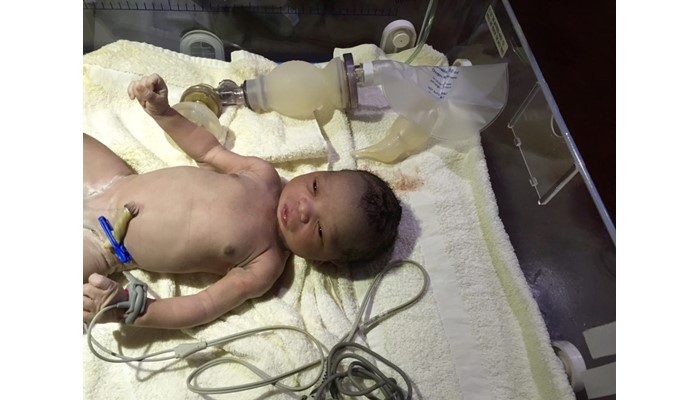“Dr. Jared, please come to maternity now, now!” When I hear one of the nurses or clinicians say this on the radio, I know it is one of two scenarios: an infant is not breathing or a soon to be born infant might not do well after birth. Either situation can happen because of prematurity or distress during labor. When we came to Malawi, I learned very quickly that the phrase “now, now” means come not only soon but very quickly. So immediately after they called me on the radio, I ran over to maternity to help and sure enough the maternity team was resuscitating an infant who was not breathing after birth.
Unfortunately, this situation occurs too often in Malawi which has one of the highest rates of prematurity in the world. About one of every five infants is born prematurely and a lot of times these infants require special care at delivery, including breathing support. Other times infants need help breathing shortly after birth because they were not receiving enough oxygen during the labor process or right before they come out. Thankfully here, at Child Legacy Hospital, we have great nurses and clinicians who know when to intervene if the baby is showing signs of distress during the labor process. However, there are many facilities in Malawi where skilled healthcare providers are not present so no intervention is even possible.
The challenging part about the mother in this situation is that she spent a lot of the laboring process at home in her village. After she finally arrived at our hospital, there was concern for the baby and the decision was made to help deliver the baby quickly. The umbilical cord wrapped around the infant’s neck twice, which also affected the amount of oxygen the infant was getting during labor.
After running from the outpatient department to maternity, I found the team busy resuscitating the infant. He still wasn’t breathing well but the nurse and clinician were doing everything they had learned to save the life of this little one. As a team, we continued to resuscitate the infant and his color began to go from blue to pink and he started to breath on his own. About 30 minutes later he looked like all his other friends in the nursery who had been born that day. We said a quick prayer with the family and left the baby boy with mom and the other caregiver for some important bonding time.
We all took a deep breath and were thankful the baby was okay, but the team buckled down because there were four other women in labor and another mom was waiting to be evaluated. This is pretty high volume for our small maternity ward considering we really only have two labor rooms. Thankfully, over the course of the night, they did not all deliver at once. The team did an excellent job of managing the cases. We had a total of six deliveries in 10 hours which is the record for number of deliveries in 12-hours period.
One of the things that we really like is watching our healthcare team grow not only in numbers but also grow individually and as a group to take really good care of the patients. Over the past couple of years, we have stressed education, protocols and procedure, and everyone working together. These are all important to the development of our hospital here, but is true for the development of a healthcare team in general.
Education is probably the most important part of development that we can play a part in. In Malawi, there are very few nurses and even fewer clinicians. There is only about one doctor for every 50,000 patients so the need for education and mentorship is very high. We both love teaching and enjoy teaching at Child Legacy Hospital through lecture and occasional trainings such as the advanced life support training that we did last year. However, a majority of our teaching happens in the exam room or at the bedside of the patient.
Since we have been here, we have found that there is a special need for not only more training in pediatrics but especially in care of the newborn. Jared has enjoyed teaching and mentoring the team as a group and one-on-one about newborn exams, routine newborn care, and neonatal resuscitation. It has been wonderful to see how much more confident the nurses and clinicians are when it comes to newborn care and especially resuscitation of babies at birth. One person will learn something and then teach another clinician or nurse about what they have learned, which is really cool to see.
While writing clinical protocols and procedures sounds quite boring, they are actually really helpful and something that we took for granted in the US because they were already established for the facilities we worked in. Several of our clinicians have commented that the clinical protocols are one of the strengths of our hospital. These are really helpful for guidance, to avoid mistakes, and to provide a better quality of care to our patients. Jenny and I started making them for the outpatient department, prenatal care clinic, and maternity ward (obstetrics and newborn care). We are continuing to develop them along with the other clinicians and nurses for the additional services that are starting. On busy and stressful nights, established protocols are really helpful and nights like the one above are when you learn if they are working and what areas need to be improved.
Finally, we’ve made an effort to stress the value of teamwork and are proud of how our team worked together that night and every day they come to serve this community. Every nurse and clinician on our team could be working somewhere else in Malawi but have felt called here by God to serve this rural community. We continue to emphasize that everyone’s role on the team is important no matter if you’re making clinical decisions, taking the vital signs, praying with the patient, sterilizing the instruments, or cleaning the labor and delivery rooms after each delivery. With everyone playing their roles and sometimes multiple roles, we continue to provide the best quality of care to improve the physical and spiritual health of our community. Go team! We are thankful to be a part of this team and to continue to watch it grow.
Unfortunately, this situation occurs too often in Malawi which has one of the highest rates of prematurity in the world. About one of every five infants is born prematurely and a lot of times these infants require special care at delivery, including breathing support. Other times infants need help breathing shortly after birth because they were not receiving enough oxygen during the labor process or right before they come out. Thankfully here, at Child Legacy Hospital, we have great nurses and clinicians who know when to intervene if the baby is showing signs of distress during the labor process. However, there are many facilities in Malawi where skilled healthcare providers are not present so no intervention is even possible.
The challenging part about the mother in this situation is that she spent a lot of the laboring process at home in her village. After she finally arrived at our hospital, there was concern for the baby and the decision was made to help deliver the baby quickly. The umbilical cord wrapped around the infant’s neck twice, which also affected the amount of oxygen the infant was getting during labor.
After running from the outpatient department to maternity, I found the team busy resuscitating the infant. He still wasn’t breathing well but the nurse and clinician were doing everything they had learned to save the life of this little one. As a team, we continued to resuscitate the infant and his color began to go from blue to pink and he started to breath on his own. About 30 minutes later he looked like all his other friends in the nursery who had been born that day. We said a quick prayer with the family and left the baby boy with mom and the other caregiver for some important bonding time.
We all took a deep breath and were thankful the baby was okay, but the team buckled down because there were four other women in labor and another mom was waiting to be evaluated. This is pretty high volume for our small maternity ward considering we really only have two labor rooms. Thankfully, over the course of the night, they did not all deliver at once. The team did an excellent job of managing the cases. We had a total of six deliveries in 10 hours which is the record for number of deliveries in 12-hours period.
One of the things that we really like is watching our healthcare team grow not only in numbers but also grow individually and as a group to take really good care of the patients. Over the past couple of years, we have stressed education, protocols and procedure, and everyone working together. These are all important to the development of our hospital here, but is true for the development of a healthcare team in general.
Education is probably the most important part of development that we can play a part in. In Malawi, there are very few nurses and even fewer clinicians. There is only about one doctor for every 50,000 patients so the need for education and mentorship is very high. We both love teaching and enjoy teaching at Child Legacy Hospital through lecture and occasional trainings such as the advanced life support training that we did last year. However, a majority of our teaching happens in the exam room or at the bedside of the patient.
Since we have been here, we have found that there is a special need for not only more training in pediatrics but especially in care of the newborn. Jared has enjoyed teaching and mentoring the team as a group and one-on-one about newborn exams, routine newborn care, and neonatal resuscitation. It has been wonderful to see how much more confident the nurses and clinicians are when it comes to newborn care and especially resuscitation of babies at birth. One person will learn something and then teach another clinician or nurse about what they have learned, which is really cool to see.
While writing clinical protocols and procedures sounds quite boring, they are actually really helpful and something that we took for granted in the US because they were already established for the facilities we worked in. Several of our clinicians have commented that the clinical protocols are one of the strengths of our hospital. These are really helpful for guidance, to avoid mistakes, and to provide a better quality of care to our patients. Jenny and I started making them for the outpatient department, prenatal care clinic, and maternity ward (obstetrics and newborn care). We are continuing to develop them along with the other clinicians and nurses for the additional services that are starting. On busy and stressful nights, established protocols are really helpful and nights like the one above are when you learn if they are working and what areas need to be improved.
Finally, we’ve made an effort to stress the value of teamwork and are proud of how our team worked together that night and every day they come to serve this community. Every nurse and clinician on our team could be working somewhere else in Malawi but have felt called here by God to serve this rural community. We continue to emphasize that everyone’s role on the team is important no matter if you’re making clinical decisions, taking the vital signs, praying with the patient, sterilizing the instruments, or cleaning the labor and delivery rooms after each delivery. With everyone playing their roles and sometimes multiple roles, we continue to provide the best quality of care to improve the physical and spiritual health of our community. Go team! We are thankful to be a part of this team and to continue to watch it grow.






